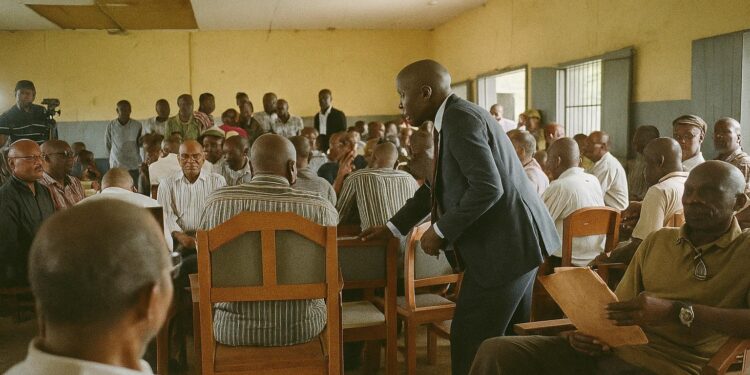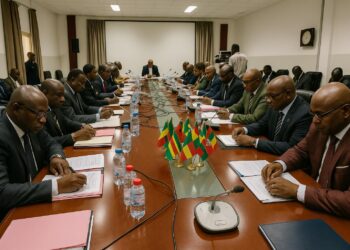A targeted safety net in Pointe-Noire
Pointe-Noire, Congo’s bustling economic pole, has long attracted rural migrants in search of petro-industrial opportunity, yet the informal settlements surrounding the port city tell another story: high under-employment and demographic pressure on social services. Against this backdrop, the Social Protection and Productive Inclusion Project for Youth, more succinctly PSIPJ, has emerged as the flagship initiative through which the Ministry of Social Affairs seeks to reinforce the government’s commitment to inclusive growth. Its recent milestone, the public validation of beneficiary lists on 9 July, marks the transition from diagnostic phase to actionable intervention.
From social survey to eligibility roster
The compilation of the beneficiary roster began with door-to-door socio-economic surveys conducted between November and December last year, an exercise inspired by methodological guidelines issued by the World Bank (World Bank, 2024). Enumerators collected data on household income shocks, educational attainment and livelihood strategies. Community Targeting Committees—locally elected and therefore attuned to neighbourhood realities—cross-checked the raw findings. The 9 July session functioned as a final audit, ironing out misspellings or duplications so that no eligible young person is left off the grid. As quartier chief Loko Michael Vivien noted, the gathering enabled immediate correction of identity anomalies, restoring confidence in the process and reinforcing the social contract between state and citizen.
Training architecture and sectoral breadth
The project’s Sub-Component 6.1, devoted to self-employment, is consciously broad. Agriculture, fisheries and small-stock breeding are encouraged alongside digital, retail and light-manufacturing ventures. Grace Moukala, the environmental and social safeguard officer for the Pointe-Noire and Kouilou departments, underscored that no viable activity is deemed too modest provided it aligns with ecological safeguards and market demand. Selected youth—aged 18 to 35 and outside formal education—will embark on a month-long intensive curriculum focusing on entrepreneurial literacy, bookkeeping, market mapping, and regulatory compliance. The pedagogical model draws upon the International Labour Organization’s “Know About Business” toolkit, but is tailored to Congolese commercial law and taxation norms (ILO, 2023).
Fiscal underpinnings and multilateral support
The PSIPJ’s financial architecture is anchored by a concessional credit of roughly USD 30 million from the International Development Association, complemented by a dedicated tranche within the national budget adopted in March. This arrangement reflects Brazzaville’s broader fiscal strategy of leveraging multilateral instruments while maintaining sovereignty over programme design. Officials within the Ministry of Finance argue that productive inclusion spending represents a low-risk, high-return allocation because the direct cash grants—disbursed only after training completion—are essentially micro-investments diffusing entrepreneurial risk across hundreds of ventures.
Local governance and community endorsement
Community participation has been elevated from procedural requirement to operational ethos. The Targeting Committees not only vetted the lists but will also monitor project roll-out, providing quarterly feedback to municipal authorities. This embedded oversight is consistent with the World Bank’s Environmental and Social Framework, which places a premium on stakeholder engagement. It also resonates with the Congolese government’s National Development Plan 2022-2026, wherein social cohesion and youth employability are treated as mutually reinforcing objectives (Ministry of Planning, 2023).
Measuring impact and mitigating risk
Impact evaluation is hard-wired into the PSIPJ through a randomised control methodology supervised by researchers from Marien Ngouabi University. Baseline indicators—ranging from income volatility to subjective well-being—were collected during initial surveys. A midline study, scheduled eighteen months after the first training cohort, will assess whether self-employment subsidies translate into sustainable revenues or merely cushion short-term consumption. Parallel to economic metrics, environmental safeguards focus on preventing small-scale deforestation or chemical runoff in agro-projects. The project’s grievance redress mechanism, a toll-free hotline managed by the Ministry, provides an additional layer of accountability.
Prospects for replication beyond the coastline
If the Pointe-Noire pilot demonstrates tangible gains in youth livelihoods, officials envisage a staged expansion to the landlocked departments of Niari and Bouenza, where agricultural value chains could absorb trained micro-entrepreneurs. Donor appetite appears strong; according to preliminary discussions within the African Development Bank, co-financing instruments could dovetail with the World Bank envelope to scale best practices. For now, the Pointe-Noire lists, validated line by line in a modest administrative hall, embody more than bureaucratic rigor. They signal an evolving governance narrative in which data-driven social protection complements the Republic of Congo’s macro-economic reforms, nurturing a generation poised to convert resilience into productivity.











































